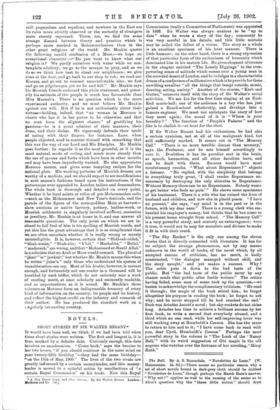NOVELS.
SHORT STORIES BY SIR WALTER BESANT.*
IT would have been well, we think, if we had been told when these short stories were written. The first and longest is, it is true, marked by a definite date. Curiously enough, this date involves an anachronism. " Come back," says the heroine to her two lovers, " if you should continue in the same mind on your twenty-fifth birthday "—they had the same birthday— "on the 15th of May, 1900." The lives of the two rivals are greatly influenced by a certain moneylender, and this money- lender is moved to a spiteful action by recollections of "a certain Royal Commission" on his trade. Now this Royal • A Five Years' Tryst, and other Stones. By Sir Walter Besant. London: Methuen and Co. r6s.3 Commission (really a Committee of Parliament) was appointed in 1898. Sir Walter was always anxious to be "up to date " when he wrote a story of the day ; commonly he was very careful in his details, and this little mistake may be called the defect of a virtue. The story as a whole is an excellent specimen of his later manner. There is little humour ; on the other hand, there is a strong expression of that particular form of the enthusiasm of humanity which dominated him in his mature life. He gives eloquent utterance in the chapter entitled " The Lonely Diggings " to the over- powering sense of solitude which comes over a young man in the crowded desert of London, and he indulges in a characteristic dream of a conference of millionaires which is to provide for the unwilling eredites " all the things that tempt outside, music, dancing, acting, society." Another of the stories, " Kerb and Gutter," connects itself with the story of Sir Walter's social activities. We see Liz for the first time singing at an East. End music-hall; one of the audience is a boy who has just gained a Board-school scholarship, and develops into a famous engineer. We must not anticipate the story of how they meet again ; the moral of it is " Where is your heredity ? " The function of " People's Palaces " and the like is to abolish it—at least for the elect.
If Sir Walter Besant had his enthusiasm, he had also a certain cynicism, not at all of the malignant kind, but still sufficiently marked. It comes out in " The Memory Cell." "There is no more terrible disease than memory," says the Professor, and he sets himself accordingly to cure it. Doubtless it has its peculiar seat in the brain, as speech, locomotion, and all other faculties have, and can be dealt with there. Success would have most revolutionary results. "What about Repentance ? " objects a listener. " He replied, with the simplicity that belongs to everything truly great, I shall render Repentance un- necessary by destroying the only stimulus to Repentance. Without Memory there can be no Repentance. Nobody wants to get better who feels no pain." He shows some specimens of his treatment. There is a wife who has ruined the lives of husband and children, and now sits in placid peace. "I have no present," she says, " my mind is in the past or in the future, with my dear ones." There is a young clerk who em. bezzled his employer's money, but thinks that he has come to his present home straight from school. " The Memory Cell" is a very powerful study, and scarcely an extravagance; were it true, it would not be easy for moralists and divines to make it fit in with their creed.
" The Sky Rocket " is the only one among the eleven stories that is directly connected with literature. It has for its subject the strange phenomenon, not by any means unknown in the world of books, of the novel which, by all accepted canons of criticism, has no merit, is badly constructed, " the dialogue managed without skill, and the story naught," and yet makes a success. Why ? The critic puts it down to the bad taste of the public. But " the bad taste of the public never by any chance sends that public after feeble writers." The critics having failed, some man of sense took up the question,—we hasten to acknowledge the complimentary criticism. " He read it through; the magic of the book seized him; he forgot altogether his purpose in reading the book ; he forgot to ask why; and he never stopped till he had reached the end." Such was Ariadne Ascott's novel ; but sky-rockets do not shine long. Ariadne has time to achieve a brilliant success by her first book, to write a second that everybody abused, and a third which no one read, while her self-improving lover was still working away at Humboldt's Cosmos. She has the sense to return to him and to it; "I have come back to read with you, dear Cyril, Humboldt's Cosmos." Perhaps the most powerful story in the volume is " The Luck of the Nancy Bell," with its weird suggestion of Obi magic in the old negress who watches over the fortunes of her nursling, "Missy Ruth."






































 Previous page
Previous page